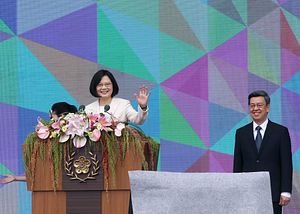Taiwan’s new president, Tsai Ing-wen, finally delivered her keenly anticipated and closely watched inaugural speech on May 20. China had made it clear ever since Tsai’s election that if she hoped for the peaceful and cooperative cross-strait relations over the past eight years to continue, she needed to come to terms with the “1992 Consensus.” Tsai did not do so in the speech, at least not explicitly. But she did show significant goodwill to Beijing by getting as close as she could to that benchmark. To avoid another missed opportunity similar to the early days of the Chen Shui-bian administration, Beijing should reciprocate Tsai’s goodwill; it has good reasons to do so.
Tsai went a long way to accommodate Beijing in her speech, to the extent that she did not even use once the term “China” to denote the mainland regime, maybe intentionally to avoid the term’s political connotation that there were two states across the Taiwan Strait. Instead, she referred to China as “the other side (of the Strait).” Similarly, she used the neutral term “cross-strait” to denote bilateral relations between China and Taiwan.
More specifically, she used three points to come as close as possible to China’s declared bottom line on the nature of cross-Strait relations, i.e. the “1992 Consensus”: she vowed to defend the Republic of China territory and sovereignty defined by the constitution, which still includes the Chinese mainland; she called the “common understanding (gongtong renzhi)” the two sides reached in 1992 a “historical fact” and proclaimed she would respect it; and she called for the two “ruling parties” across the Strait to hold dialogues and cooperate, a designation, which was much less ambitious than Ma Ying-jeou’s preached model of “one country, two governments,” but closer to the Chinese Communist Party’s (CCP) preferred model of party-to-party talks.
For China, without explicitly accepting the “1992 Consensus” and its one China connotation, Tsai’s speech might not be enough to rectify her pro-independence record. However, the speech does reveal significant goodwill, and the points highlighted above should be bearable to Beijing at the moment. Chinese leaders should also realize that such compromises, though not perfectly aligned with their preferences, must have been unpalatable to Tsai’s core supporters and cost her significant political capital. Xi Jinping thus should reciprocate Tsai’s goodwill to avoid the same missed opportunity of the early days of the last Democratic Progressive Party government, when the CCP’s failure to reciprocate Chen Shui-bian’s reconciliation forced Chen to retreat to his hardcore political base and led to ever-deteriorating cross-strait relations.
Beijing also has good reasons to reciprocate this time. Vastly different from Chen’s election in 2000, Tsai has led the DPP to a landslide victory not only in the presidential election but also the legislative one. Therefore, Beijing will likely need to deal with the DPP for a long time, and boycotting the new administration is less likely to bring a friendly party back to power in Taiwan now than in the early 2000s. The expectation of long-term interactions with the DPP should tilt Chinese leaders’ calculations toward a more proactive and pro-cooperative direction, particularly as Tsai has shown her initial intention to seek compromise. The strategic environment China faces now is also vastly different from that in the early 2000s, when Beijing’s charm offensive swept through the region and the U.S. war on terror distracted Washington’s attention. Beijing’s recent assertive behavior has led to confrontational relations with the bulk of its East Asian neighbors and instigated a U.S. “rebalance” toward Asia. To add cross-strait relations to the list of sore points and have the whole eastern front flare up is hardly a prudent strategic calculation.
As the inaugural speech fell short of completely dissolving Beijing’s suspicion about her true intention, only time will now vindicate Tsai Ing-wen’s commitment to the pre-inauguration cross-strait status quo. However, Beijing should help buy her that time. Chinese leaders would be ill-advised to overplay their displeasure and significantly scale back existing exchanges. Such disruptive punishments will only make China look insatiable and shorten the time Tsai could stay in the middle ground without retreating back to her sinophobic core constituencies. The CCP should open communication channels with the DPP to give both sides opportunities to measure each other’s intentions and see whether the DPP can deliver on Tsai’s promises. For instance, China should allow Taiwan’s attendance at the World Health Assembly and International Civil Aviation Organization to proceed as in previous years, buying time to see whether Tsai will table de-sinicization measures her pro-independence supporters will certainly press her to carry out.
In sum, as Tsai Ing-wen has shown some concrete gestures of reconciliation, Xi Jinping should not prematurely shut the door on exchanges. China has a lot on its plate now, and to let 23 million Taiwanese live again in angry isolation will not be costless to China.
Dalton Lin is a current fellow at the China and the World Program, Woodrow Wilson School, Princeton University.
































